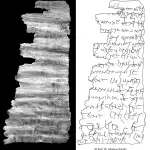
I wrote days ago about The Quest for the Historical Jesus at the Society of Biblical Literature’s Annual Meeting I attended late last month. I said this 250-year academic study has in the past few years entered into its fourth stage. Some call it the Fourth Quest for the Historical Jesus. It is by far the most extensive investigation ever undertaken by scholars of some famous person in history.
This fourth stage or quest concerns only the accounts of Jesus in the New Testament Gospel of John. All students acknowledge it is substantially different from the first three gospels in the New Testament: Matthew, Mark, and Luke. These three all called “synoptics” because they are very similar in their many accounts of what Jesus of Nazareth said and did.
The Divide Among Johannine Scholars
Moreover, there has always been a divide among New Testament scholars about the Gospel of John in this Quest. Nearly all scholars, both conservatives (most of whom identify as “Trinitarian”) and historical critics, agree that the synoptics present Jesus as a man and no more, thus not God or divine. And concerning the Gospel of John, both sides agree that it differs from the synoptics by presenting Jesus as both a man and God. The historical critical scholars conclude that Jesus most certainly was not God and therefore the Gospel of John cannot be received as a historically reliable document for the investigation of the real man of history—Jesus of Nazareth. In contrast, conservatives accept the Gospel of John as a historically reliable source and therefore conclude that Jesus really was both man and God. This belief they often refer to as “the deity of Christ.”
But I believe both sides are wrong in their interpretation that the Gospel of John says Jesus is God. Although it is different from the synoptics, it does not conflict with them. That is, all four New Testament gospels present Jesus as a man (how God intended humans to be when he created them), but not as God.
A a Former Trinitarian, I Believe Like Robinson
I was a Trinitarian for 22 years. That means God is three co-equal and co-eternal Persons: Father, Son (Jesus Christ), and the Holy Spirit. Thus, I believed Jesus is God, what Trinitarians call “the deity of Christ,” because that is what, like most Christians, I was taught. Then I had an epiphany moment while reading my Bible one day that led me to a very serious investigation of Jesus’ identity. It was Jesus’ saying in Matthew 24.36 concerning his future return: “Of that day or hour no man knows, neither the angels of heaven, nor the Son,” referring to himself, “but only the Father.” After much study, I concluded that the Bible does not say Jesus is God. I wrote two books about it: The Restitution: Biblical Proof Jesus Is NOT God (570 pp.) and The Gospel Corrupted: When Jesus Was Made God (118 pp.), both available on amazon.com. The Restitution is for deep study, since it analyzes critical Biblical texts and references the writings of over 400 scholars, whereas The Gospel Corrupted is an easy-reading primer for it which does not cite scholars.
The New Testament scholar whom I quote the most often in The Restitution who agrees totally as I do—that the Gospel of John does not say Jesus is God and that it is a historically reliable document—is John A. T. Robinson (1919-1983). He also was a bishop in the Church of England. Robinson probably was one of the two greatest British New Testament scholars of the twentieth century.
The Fourth Quest Rediscovers J. A. T. Robinson
This fourth stage of the Quest for the Historical Jesus is being conducted largely because of a recent rediscovery by Johannine scholars of the truth of J. A. T. Robinson about the Gospel of John. Many historical critical scholars are realizing that Robinson was right in his book, The Priority of John, that the Gospel of John is indeed a historically reliable document for the investigation of Jesus of Nazareth.
But that is not all Robinson says in that book, and others, he wrote about the Gospel of John. Robinson also said, as I do, that the Gospel of John does not say Jesus is God. Now, Robinson and I also believe in Jesus’ atoning death for our sins, God raising him from the dead, and Jesus’ heavenly ascension.
I state in my blog post Historicity of the Gospel of John, “Contemporary, leading Johannine scholars who believe the Fourth Gospel says Jesus is God include Paul Anderson, Richard Bauckham, Tom Thatcher, Felix Just, and now Jorg Frey. Older Johannine scholars who believed likewise included C. H. Dodd, J. Louis Martyn, Raymond E. Brown, and Culpepper.”
I suspect that what is going to happen with the Quest is that this fourth stage may end by concluding that the Gospel of John indeed is a reliable historical source for investigating Jesus and that a fifth stage will arise in which scholars will rethink whether it says Jesus is God and that most leading scholars involved in this quest will conclude that it does not.
Some Quotations of J. A. T. Robinson
I have seven of Robinson’s theology books in my library. The following are excerpts from just one of his books, Twelve More New Testament Studies, and I have some of these quotes in my book, The Restitution:
- “As is well known, a considerable critical reaction has more recently set in in New Testament circles against writing off the historical value of the Johannine tradition—a reaction with which I have long been in sympathy” (p. 141).
- “The picture which John gives us of Jesus and the use that we can make of it for doctrine, the criteria have not, I think, been adequately reassessed” (p. 141).
- “As the New Quest [for the Historical Jesus, which was the second stage of it] progresses, the Gospel of John must come into its own again as a primary source” (p. 166).
- referring to John 17.5, “… the ego of the human Jesus, which is no more preexistent than that of any other human being. Nor are statements about the glory that he enjoyed with the Father before the world was to be taken at the level of psychological reminiscence. As such they would clearly be destructive of any genuine humanness. … The voice with which Jesus speaks and the authority with which he acts and claims allegiance is that of the Word which transcends time and space” (p. 167).
- “It is inconceivable, … either in the evangelist’s intention or in the mind of Jesus’ opponents, that it should not come out in the charges against him at the trial, where again the worst that can be said about his is that he claimed to be ‘God’s son’ (19.7)” (pp. 168-69).
- “There can be no residue or trace of a Christology that says that Jesus said or did some things as God and some things as man” (p. 170). Here, Robinson opposes the Trinitarian doctrine of the Hypostatic Union of Christ, meaning that Jesus had two natures: a human nature and a divine nature.
- “John is as undeviating a witness as any in the New Testament to the fundamental tenet of Judaism, of unitary monotheism (cf. Rom. 3.30; James 2.19). There is the one, true and only God (John 5.44; 17.3)” (p. 175).
- “The clear evidence of the gospel [of John] that Jesus refuses the claim to be God (10.33)” (p. 175).
- Concerning Jesus’ several ego eimi (“I am”) sayings without a predicate in the Gospel of John, “These are not assertions about the ego of human Jesus, which is no more pre-existent than that of any other human being” (p. 166).
- “We should, however, reject the view that ego eimi means ‘I am God'” (p. 176).













